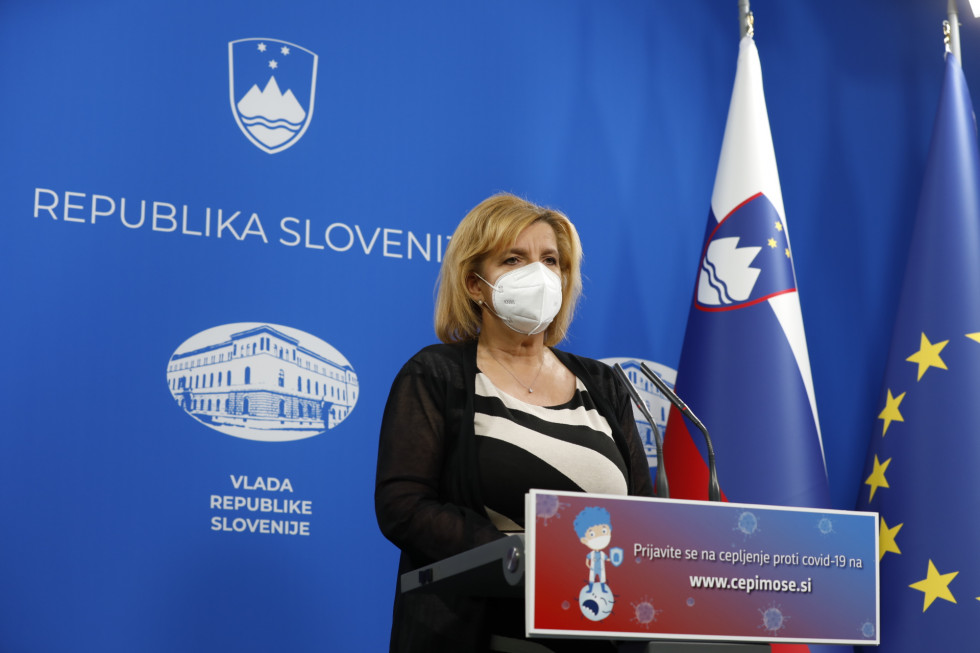By: UKOM
A press conference on the current situation regarding COVID-19 featured the head of the vaccination advisory group, Bojana Beović.
According to the current data, a total of 1,501 PCR tests and 7,598 rapid antigen tests were conducted yesterday. The PCR tests confirmed 91 new infections, which amounts to a positivity rate of 6.1 percent. According to data published today, the seven-day average of confirmed cases is 276 infections.
245 patients are being treated for COVID-19 in hospitals, which is three more than on Sunday. 72 thereof require intensive care, and one patient with COVID-19 died yesterday.
Vaccination continues. This morning’s data show that 661,138 people have received their first dose of a vaccine and 402,688 have been fully vaccinated.
Bojana Beović, the head of the vaccination advisory group, began by saying that the European Medicines Agency had issued a positive opinion on vaccinating children from the age of 12 with the Pfizer/BioNTech vaccine. This means that the vaccination of children from the age of 12 may begin in Slovenia. The group will first recommend it to children with chronic diseases, as was also advised with regard to the adult population.
The vaccination advisory group will meet this week to issue a formal opinion, which will then form the basis of the recommendations of the National Institute of Public Health (NIJZ) aimed at promoting the vaccination of particularly vulnerable groups of children with chronic diseases, as these could aggravate the course of COVID-19 in such patients, said Beović.
She went on to say that German researchers had identified a possible cause of the side effects that appeared especially after vaccination with the AstraZeneca and Janssen vaccines. This is also important because the discovery will make it possible to improve the vaccine, as we want as many COVID-19 vaccines to be available during the period when vaccines can be selected.
In Slovenia, 39 percent of the adult population has already received the first dose of a vaccine, and about a quarter have been fully vaccinated. Beović pointed out that the first dose of a vaccine greatly reduces the likelihood of the disease taking a severe course and requiring hospitalisation, or even prevents a fatal outcome.
The second dose of a vaccine increases and prolongs the effect of vaccination, and is especially important due to the resulting efficacy of the vaccine against new variants of the COVID-19 virus.
In Slovenia, vaccines are used in accordance with the recommendations of the European Medicines Agency, with which the vaccination intervals between the first and second doses are compliant. Moreover, AstraZeneca allows the possibility of vaccination before the twelfth week if people need to be vaccinated sooner for any reason. It is also up to individuals themselves how to be vaccinated after recovery from COVID-19. When the vaccines were scarce, the advisory group recommended only one vaccination for persons who have recovered from COVID-19, and only six months after recovery, when protection begins to weaken. However, given the current relatively high vaccination rate, when the availability of vaccines is greater as well, people are given the opportunity to be vaccinated earlier, before the lapse of six months, even with two doses if necessary.
Bojana Beović, the head of the vaccination advisory group, concluded by emphasising that in the autumn a normal life without measures will be possible only if the percentage of the population vaccinated is high enough to establish collective immunity. For the so-called Wuhan version of the virus, the required share is estimated to be between 66 and 70 percent of the population, while for the more contagious variants of the new coronavirus a larger proportion of the population must be vaccinated.
Source: gov.si

